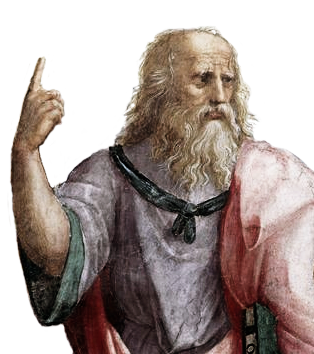
Philosopher king
The philosopher king is a hypothetical ruler in whom political skill is combined with philosophical knowledge. The concept of a city-state ruled by philosophers is first explored in Plato's Republic, written around 375 BC. Plato argued that the ideal state – one which ensured the maximum possible happiness for all its citizens – could only be brought into being by a ruler possessed of absolute knowledge, obtained through philosophical study. From the Middle Ages onwards, Islamic and Jewish authors expanded on the theory, adapting it to suit their own conceptions of the perfect ruler.
For other uses, see Philosopher King (disambiguation).Several historical figures, including Alexander the Great and Marcus Aurelius, have been described by ancient and modern writers as embodying the philosopher king ideal.
History of interpretation[edit]
Aristotle, in his Politics, criticises many aspects of Plato's political theory, and sets out his own ideas about how a perfect city should be governed. Rather than proposing, as Plato does, the establishment of a ruling class, Aristotle argues that all citizens should take an equal share in the administration of the city. However, in one passage (book 3, ch. 13), Aristotle does write that if one or more people happened to be found who far excelled their fellow citizens in virtue, it would be against the natural order for such people to be subject to the rule of their inferiors, and they should therefore be made "kings in their state for life". While Aristotle here comes close to endorsing the philosopher-king ideal, he does not expressly state that this virtuous leader should be skilled in philosophy, and his writings more usually draw a sharp distinction between the theoretical wisdom of a philosopher and the political wisdom of a ruler.[10]
When the Politics was translated into Latin in the thirteenth century, it became the foundational text for political philosophy in the Christian world, and Plato's ideas were marginalised in favour of an Aristotelian separation of temporal and spiritual authority. Islamic scholars, on the other hand, were heavily influenced by Plato's Republic, finding in the philosopher king a counterpart to the traditional figure of the "lawgiver-prophet".[11] Al-Farabi, for example, followed Plato closely, writing that the ideal state was that which most carefully attended to the spiritual education of its citizens, and that its ruler must therefore have a highly developed understanding of the purpose of human existence. Where Al-Farabi departed from Plato was in asserting that the founder of the perfect state must not only be a philosopher but also a prophet, as the perfect law could only come from God. The founder's successors need not be prophets, but they must still be philosophers, able to correctly interpret and apply the received law.[12]
Medieval Islamic philosophers had many opportunities to put their political theories into practice, as they often held positions in the royal court, with many even serving as viziers. Despite their belief in the philosopher king ideal, no Islamic philosophers are known to have attempted to seize power for themselves, apparently being contented with a subservient position. Al-Farabi makes a concession to this state of affairs when he writes that, since rulers possessed of all the necessary virtues are rare, it is possible for the kingship of the ideal state to be shared between two people, "one of whom is a philosopher and the other fulfils the remaining conditions".[13]
The translation into Hebrew of the works of Al-Farabi and Averroes saw the concept of the philosopher king enter into Jewish political thought. Biblical figures such as Moses, Abraham and Solomon were held up as examples of ideal rulers, with Plato's theory undergoing further distortions in order to meet the needs of Jewish philosophers. The popularity of the idea finally declined during the seventeenth century, as influential authors such as Baruch Spinoza began to formulate more secular political philosophies modelled on the works of Machiavelli.[14]
Real-world examples[edit]
Dionysius and Dion[edit]
It appears from the Republic that Plato did not think it impossible for his ideal state to be established in reality,[15] and he did make one notable attempt to educate a ruler in the principles of philosophy. In 367 BC, Dionysius II came to power in Syracuse, Sicily, under the supervision of his uncle Dion, who was a friend and disciple of Plato. Dion invited Plato to Syracuse to serve as an advisor to Dionysius, and Plato accepted. However, he probably hoped for nothing more than to exercise a moderating influence on the tyrant; he is unlikely to have believed that he could transform Dionysius into a true philosopher king. In the event, Dionysius proved an unwilling student, and nothing came of the endeavor.[16][17]
Later, Dion attempted to seize power for himself, and was ultimately assassinated. In his possibly spurious Seventh Letter, Plato regretted Dion's death, and wrote that: